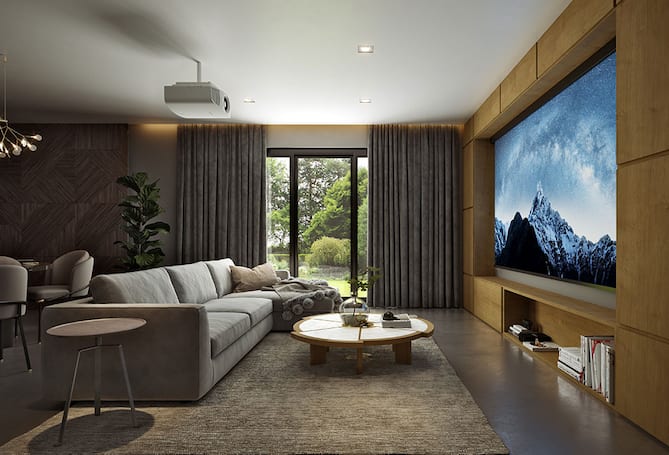Home Projectors: Everything You Need to Know Before You Buy

Best Selling Products carousel(6 Items)
If you’re hoping to upgrade your viewing experience or create your own home theater, a new projector is the device for you. But shopping for a home projector can be a bit more complicated than just picking out a new TV. With various metrics and details to consider, there can be a lot to learn about projector specifics.
In this guide, we’ll break down everything you need to know to find the best projector for you.
Why buy a home projector?
Home projectors can take your content display to the next level with a variety of exciting features. One of the most noteworthy advantages is size. Depending on the model you choose, projectors can produce a maximum screen size of up to 100 – 200 inches, which is a significantly larger image than most TVs. Not to mention, the body of the projector is much smaller than a television, which can make bringing your new device home an easier feat.
Projectors are also simple to install, allow for portability, and their displayed image places less stress on your eyes than a TV’s screen. But if you’re still unsure if this device is right for you, you can visit our Discover & Learn page for a more detailed breakdown of the benefits of projectors vs. TVs.
Although, if your heart is set on a new projector, keep reading below for the five most important things to consider before you buy.
1. Projector purpose
Projectors are highly versatile machines. Within the right environment, projectors can be educational, informational and entertaining. So, determining how you want to use your projector before you buy it can help you get the most out of your new device.
If you’re looking for a home theater projector that delivers an in-the-cinema feel, focus your search on devices with a dynamic contrast ratio so you can get rich details in even the darkest scenes. Or you could try a 4K projector to experience an extremely crisp, high-definition image.
Alternatively, if you want to use your projector for meetings, presentations, or classroom instruction, you may want to explore business projectors. Also known as multimedia or data projectors, these devices are brighter than home theater projectors so you can deliver your presentation in rooms with light coming in from windows and overhead fixtures.
2. Projector placement
When it comes to projectors, location is everything. Therefore, you’ll want to scope out your preferred display area before selecting a specific model. For a more permanent placement that stays out of reach and avoids clutter, consider using a projector mount. These supportive structures allow you to mount your projector to the ceiling, which can be especially nice for a home theater setup. Or, if you want to be able to move your projector around or take it on the go, mini projectors can be highly portable, and some models come with useful kickstands for angles and positioning.
Another detail you’ll want to investigate when buying a new home projector is the throw ratio range. This measurement indicates how large a projected image can be when produced from a certain distance. The smaller the ratio, the closer the projector can be to the screen while still creating a large image. If you know your space is limited, a short throw projector will let you place your new device close to the wall without compromising quality.
3. Projector display types
Choosing the right display type can ensure you have the best range of light and color for your viewing experience. Your projector’s display technology can determine multiple aspects of your image, including contrast, brightness and saturation.
There are three primary technologies used for projection: DLP, 3LCD, and LCoS. Digital Light Processing (DLP) projectors use mirrors to reflect light onto the screen and produce smooth motion for videos and fast-action scenes. Three-Panel Liquid Crystal Display (3LCD) projectors use multiple panels to combine colors and make a vibrant image. And Liquid Crystal on Silicon (LCoS) projectors use liquid crystal chips with a mirrored backing to create a high-resolution picture.
4. Projector light sources
5. Other projector features
Once you’ve decided on the main projector elements you’re looking for, you can explore other valuable features and metrics.
If you’re worried that your space may be too bright to see the projection, be sure to examine how many lumens your projector offers. Most projectors will specify two separate brightness measurements: white brightness and color brightness, and the higher the lumens, the brighter your projected image will be. You can also pair your new device with a projector screen for added brightness and clarity.
You can also find projectors with beneficial features for your setup and viewing experience. For easy access, try a Bluetooth-enabled home projector with a corresponding app so you can control your new projector from your smartphone or tablet. And if you want an all-in-one device that offers quality audio without an accompanying sound system, you can find projectors with built-in speakers. You can even take your movie night to the next level with projectors that utilize 3D technology for a truly immersive event.